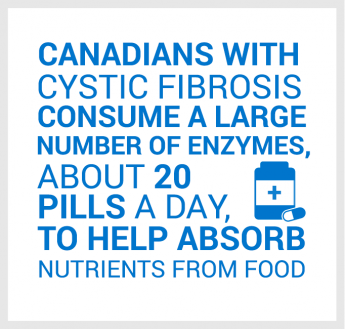CYSTIC FIBROSIS CANADA INVESTING MORE THAN $2 MILLION IN RESEARCH RESPONDING TO THE NEEDS OF PEOPLE IMPACTED BY CYSTIC FIBROSIS
Toronto, Ontario (April 18, 2024) – Cystic Fibrosis Canada today announced a new investment of more than $2 million in research initiatives that align with the Canadian cystic fibrosis (CF) community’s top priorities.
Funding began on April 1, 2024 and includes support for nine projects that respond to areas of need for people with CF, including those experiencing more severe complications – like lung infections, gastrointestinal pain and CF-related diabetes – and those who can’t benefit from CFTR modulators or are not eligible to receive them.
“Cystic fibrosis has no cure and an unacceptably high mortality rate. In addition, many people in Canada’s CF community are not eligible for the newest treatments. That’s why research is crucial,” said Dr. Paul Eckford, Chief Scientific Officer at Cystic Fibrosis Canada. “Research fuels progress to lessen the impact of cystic fibrosis on the thousands of affected Canadians and ensure no one is left behind. The research we are funding this year builds on the progress we’ve already made in CF for continued momentum towards better outcomes for everyone.”
Cystic Fibrosis Canada’s research funding is grounded in 11 different health priorities that the Canadian cystic fibrosis community has agreed will make the biggest difference in improving the lives of people with CF. The projects being funded were selected following thoughtful evaluation by a panel of scientific experts and CF community members.
“It’s essential that CF research is based in strong science and backed by the needed funding to bring us closer to a cure,” said James Fournier, a Montreal resident whose five-year-old son lives with CF. Fournier is one of eight community reviewers who worked alongside scientific experts to review and evaluate the different research proposals put forward to Cystic Fibrosis Canada for funding consideration. “Being a community reviewer has allowed me to be a part of work that aims to find treatments and a cure – things that will help my family and so many others. This year, I realized how much the input of community reviewers matters. I saw my feedback being listened to, and changes being made because of it. As a parent of a child with CF, it was meaningful to be part of guiding research funding aligned to the priorities of the CF community.”
“To our generous donors, partners and volunteers who supported Cystic Fibrosis Canada in 2023, we thank you for helping to maintain a strong research pipeline that is essential to continued progress in CF,” said Kelly Grover, President and CEO of Cystic Fibrosis Canada. “These research initiatives are your generosity in action and a critical part of our work to help Canadians with CF live longer, healthier and fuller lives.”
Research grants, valued at up to $100,000 per year for up to three years, are the backbone of progress in understanding and treating CF and informing improvements in care. From continuing to build our understanding of CF to improving treatment and quality of life, these initiatives yield the incremental gains that breakthroughs are built upon. This year’s recipients are:
- Dr. Christine Bear, The Hospital for Sick Children: Increasing the sensitivity of theratyping studies in nasal epithelial cultures derived from people with rare CF-causing mutations
CF community priority this research addresses: Help people with CF improve and sustain adherence to treatment, Reduce hospitalizations by maximizing the therapies that can be done from home, Reduce treatment burden
- Recipient of the 2024 Robbie Award for most promising new research project:
Dr. Valerie Chappe, Dalhousie University: Role of VIP and GLP-1 in Cystic Fibrosis Related Diabetes
Includes $100,000 of co-funding from Research Nova Scotia
CF community priority this research addresses: Prevent or Treat CF Related Diabetes, Reduce treatment burden, Understand health issues for people living with CF aged 50+
- Recipient of the 2024 Senior Scientist Research Award recognizing the outstanding contributions of an established CF investigator:
Dr. Jonathan Dennis, University of Alberta: Phage Therapy for Burkholderia CF Lung Infections
CF community priority this research addresses: Improve airway infection detection and treatment, Predict and prevent pulmonary exacerbations
- Dr. Tanja Gonska, The Hospital for Sick Children: Interrogating the causes for persisting gastrointestinal symptoms in people with CF on treatment with high efficient CFTR modulators (HEMT).
CF community priority this research addresses: Improve GI Pain Management
- Recipient of the 2024 Cathleen Morrison Research Impact Award, recognized by community reviewers as having the greatest potential to impact people living with CF:
Dr. Theo Moraes, The Hospital for Sick Children: Establishing a Canadian Cystic Fibrosis Theratyping Platform
CF community priority this research addresses: Relevance to Canadian CF community
- Dr. Michael Parkins, University of Calgary: Hepatitis E virus and Cystic Fibrosis
CF community priority this research addresses: Relevance to Canadian CF community
In addition to the research grants, Cystic Fibrosis Canada’s investment includes early career investigator awards and research fellowships. This funding maintains a strong CF research ecosystem by supporting the CF research community’s rising stars to become the next generation of research talent in Canada. Congratulations to the three newest recipients of these awards:
- Dr. Omar El-Halfawy, University of Regina: Uncovering cryptic antibiotic resistance mechanisms and new antimicrobials for chronic CF infections
CF community priority this research addresses: Eradicate chronic pseudomonas aeruginosa infections, improve airway infection detection and treatment
- Recipient of the 2024 Jennifer and Robert Sturgess Fellowship for being the top ranked fellowship by the scientific review panel:
Dr. Steven Kelly, McMaster University: Characterization of Pseudomonas H3-type VI secretion effectors
Supervisor: Dr. John Whitney
CF community priority this research addresses: Eradicate chronic pseudomonas aeruginosa infections, improve airway infection detection and treatment
- Recipient of the 2024 Marsha Morton Early Career Investigator Award for being the top ranked early career investigator project by the scientific review panel:
Dr. Bowen Li, University of Toronto: Engineering tRNA Lipid Nanoparticles for Suppressing Nonsense Mutations in Cystic Fibrosis.
CF community priority this research addresses: Cure CF with gene or stem cell therapies, Reduce treatment burden
Visit our infographic to learn more about the research being funded.
About Cystic Fibrosis
Cystic fibrosis is the most common fatal genetic disease affecting Canadian children and young adults. There is no cure. Of the Canadians with cystic fibrosis who died in the past five years, half were under the age of 38. Cystic fibrosis is a progressive, degenerative multi-system disease that affects mainly the lungs and digestive system. In the lungs, where the effects are most devastating, a build-up of thick mucus causes severe respiratory problems. Mucus and protein also build up in the digestive tract, making it difficult to digest and absorb nutrients from food. In addition to the physical effects of the disease, mental health concerns are emerging; anxiety and depression are common among this population. Double lung transplants are the final option for patients with end-stage disease; most fatalities of people with cystic fibrosis are due to lung disease.
About Cystic Fibrosis Canada
Cystic Fibrosis Canada has dramatically changed the cystic fibrosis story, advancing research and care that has more than doubled life expectancy. Since being founded by parents in 1960, Cystic Fibrosis Canada has grown into a leading organization with a central role engaging people living with cystic fibrosis, parents and caregivers, volunteers, researchers and healthcare professionals, government, and donors, all working together to change lives through treatments, research, information, support and connection. In the last five years in particular, Cystic Fibrosis Canada has driven the pace of progress across the country. It launched a clinical trials network, and today 100 per cent of the population can be referred to a trial—bringing new and improved treatments to our community. Cystic Fibrosis Canada has also set the standard for advocacy work, driving changes to the health-care system to enable approval and funding for the life-changing medicine, Trikafta, at record speed. Because of this work, children born with the disease today will have a much different, more positive path than even a decade ago. While we celebrate that progress and are proud of the treatments Cystic Fibrosis Canada helped bring to this country, we still have much work to do. Trikafta is not a cure. People are still very sick from this disease and far too many are dying far too young. We are also in unchartered territory as people are living longer with CF than ever—new complications are arising as more people age. We will need to continue to work closely with people living with CF to understand the burdens they face and where we should focus our work.
---
For more information, please contact:
Chloe Hall




